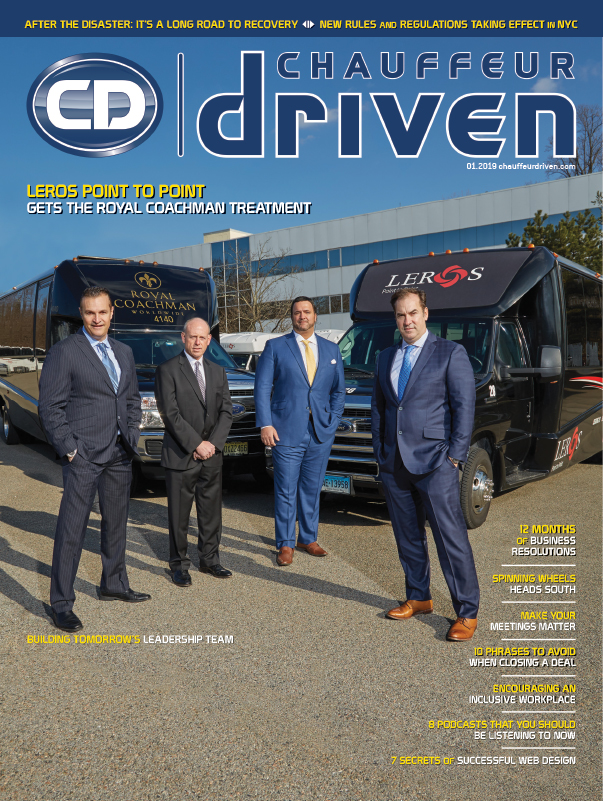 Cover Art: L to R: Leros CFO Chris Nyikos, retiring Royal Coachman President Jon Epstein, Leros COO Mike Basso, and Leros CEO Jeff Nyikos at Leros’ headquarters in Valhalla, N.Y. Photography by Bryan Chris.
In November 2018, the luxury ground transportation industry was floored by the news that Leros Point to Point of Valhalla, N.Y., had just completed its acquisition of Royal Coachman Worldwide, a long-standing operation based out of Denville, N.J. While mergers and acquisitions (M&As) have become more and more common in our industry, it’s rare to see two companies of this size involved in a deal that could only be described as monumental.
Cover Art: L to R: Leros CFO Chris Nyikos, retiring Royal Coachman President Jon Epstein, Leros COO Mike Basso, and Leros CEO Jeff Nyikos at Leros’ headquarters in Valhalla, N.Y. Photography by Bryan Chris.
In November 2018, the luxury ground transportation industry was floored by the news that Leros Point to Point of Valhalla, N.Y., had just completed its acquisition of Royal Coachman Worldwide, a long-standing operation based out of Denville, N.J. While mergers and acquisitions (M&As) have become more and more common in our industry, it’s rare to see two companies of this size involved in a deal that could only be described as monumental.
Chauffeur Driven was thrilled when Leros (and now Royal Coachman) CEO Jeff Nyikos and retiring Royal Coachman President Jon Epstein gave us first rights to the story of the purchase, which set our social media sites ablaze. Once the proverbial smoke cleared, Nyikos and Epstein agreed to talk with the magazine, along with Leros/Royal Coachman CFO Chris Nyikos and COO Mike Basso, to discuss the acquisition process and their future plans, both in—and out—of the industry.
Chauffeur Driven: What were the circumstances that led to Leros pursuing the acquisition of Royal Coachman?
Jeff Nyikos: The whole deal started through a conversation our Executive Vice President Jeffrey Cartagena had with Jon Epstein at a Limousine Association of New Jersey (LANJ) meeting.
Jon Epstein: I had just come back from skiing in Colorado. I flew in specifically for the meeting, and frankly, I did not want to come back—and I was making that known. I was sitting with Jeff Cartagena: He was talking about acquisitions, I was talking about wanting to get out. He turned to me and said, “Would you ever consider?” and I said, “Of course, I would consider.” From there, the Leros guys came to look at the office and check out the software. Then, we went out, had a four-hour dinner, and discussed a bunch of things. It took off from there. That first conversation was March 28, 2018, and the deal was finalized in November.
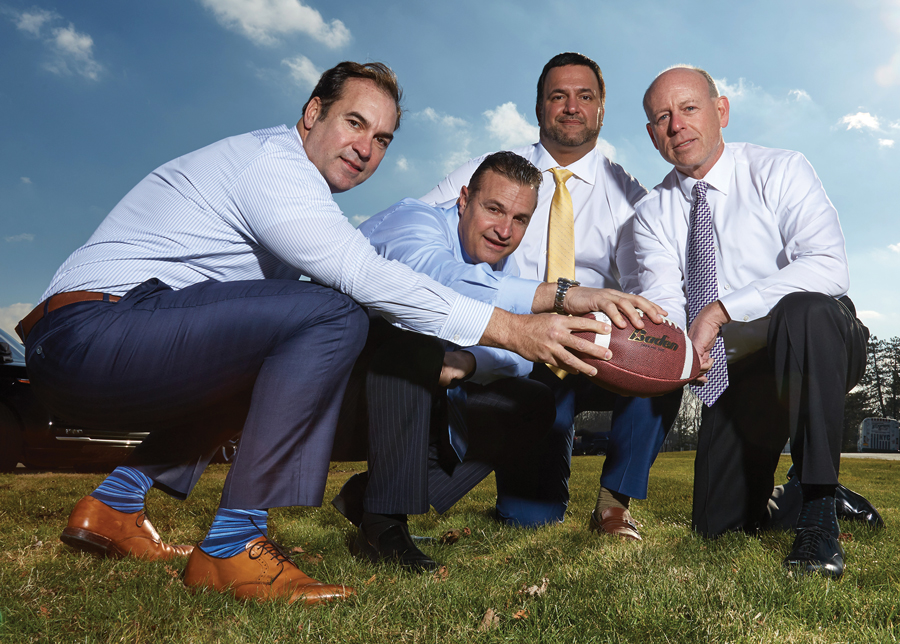 Game time at Leros headquarters in Valhalla, N.Y. (L to R): CEO Jeff Nyikos, CFO Chris Nyikos, COO Michael Basso, and retiring Royal Coachman President Jon Epstein
CD: Jon, were you actively seeking a sale?
Game time at Leros headquarters in Valhalla, N.Y. (L to R): CEO Jeff Nyikos, CFO Chris Nyikos, COO Michael Basso, and retiring Royal Coachman President Jon Epstein
CD: Jon, were you actively seeking a sale?
JE: I think everyone in this industry is interested in an exit strategy. Operators frequently talk about it in our 20-groups and at industry events. For me, it really boiled down to luck and timing. My business was not up for sale; in fact, I never would put my business up for sale—to me, that’s a sign of weakness.
JN: The industry is aging. If you look at most of the key figures, they’ve been in the industry for 20-30 years. Unless you have a second or third generation getting involved in the mix and taking over the business, there aren’t many exit strategies to take. You have to find someone in the industry who will be willing to take you over. It’s not like private equity is abound taking over companies left and right. You see it a little bit, but it’s certainly not rampant. There’s really only two choices: you either sell and work out a deal or move it to the next generation. Unfortunately, what a lot of people do is keep running the business until it runs into the ground and nothing is left.
CD: Was this an unusual transaction since you had such a good relationship beforehand?
Mike Basso: It really adds to the deal when you consider the other person involved a friend. Even our attorneys made a comment that they’d never been in an M&A situation where both sides were sticking up for the other. Having that comfort level makes things much easier. An advantage to industry events and association meetings is developing those relationships with other operators.
JE: It was great to work with the guys from Leros. Jeff and I have known each other for 15-20 years. When you can talk openly with the other party involved with an M&A, it certainly helps a lot with the process. We were both very candid and very transparent through the whole thing, which is why the deal worked.
CD: For an acquisition this large, six months seems to be a relatively short amount of time. How did you manage to close a deal that size so quickly?
JE: Well, it seemed like forever to me! But, the thing that was unique about this deal was that we agreed on the number at the first meeting. Then it was just a matter of how to get there. That’s the part where you have to be a little creative.
MB: We probably had the framework of the deal done in three meetings.
JN: The longest part of the whole process was working with the bank. The whole key to the deal was the bank giving us the financing needed to complete the acquisition. For anyone out there who wants to do a deal like this, there are two important things to keep in mind: First, you want to have a good relationship with the bank. Second, you want to have good credit. Without that excellent credit, the deal simply doesn’t take place. Period. Whatever the amount of money that you’re borrowing, if you don’t have that credit, they’ll kill you on the interest rate, and then it won’t make sense financially. You can go out to private equity, but then you’ll have to sell a piece of your business. Those are the two options—unless you’re flush with cash.
In this industry, the most important thing is cash flow: There are peaks and valleys during different times of the year. You need to structure a deal that works for you in terms of cash flow.
Chris Nyikos: Another thing that was advantageous was the fact that we both had the same software. We’re both on SantaCruz. That really helped in making a smooth transition.
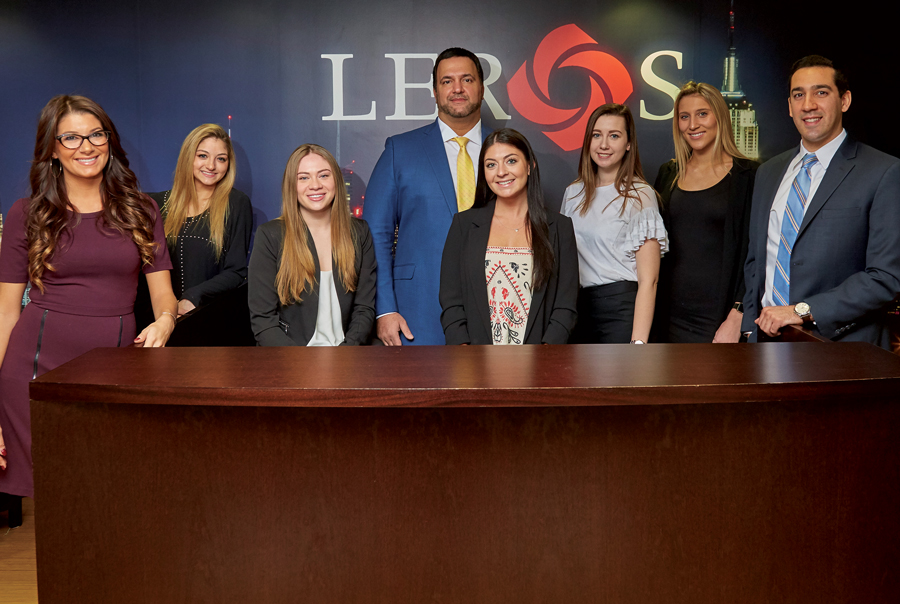 Leros customer service and sales team with COO Mike Basso (rear) at Leros’ headquarters (L to R): Reservation Manager Kelcy Peterson; Event Coordinator Jessi Harkins; Customer Service Specialists Katie Rian, Victoria Vosler, Molly Kelly, and Jordan Decker; and Vice President of Business Development Dan Aucar
CD: Jon, was the decision to sell Royal Coachman somewhat bittersweet since it’s a family-run company? Was there any consideration to passing it to the next generation?
Leros customer service and sales team with COO Mike Basso (rear) at Leros’ headquarters (L to R): Reservation Manager Kelcy Peterson; Event Coordinator Jessi Harkins; Customer Service Specialists Katie Rian, Victoria Vosler, Molly Kelly, and Jordan Decker; and Vice President of Business Development Dan Aucar
CD: Jon, was the decision to sell Royal Coachman somewhat bittersweet since it’s a family-run company? Was there any consideration to passing it to the next generation?
JE: My dad started the business in 1969, and he is totally on board with what we decided to do. I’ve been involved with Royal Coachman since I was 8 years old and washing cars—and that’s a long friggin’ time to be doing the same thing. I was just ready to move on, to be quite honest with you. My wife retired a year and a half ago, so I decided it was time.
We purposely did not want our kids in the business. That goes for my sister Amy, as well, who is my partner in the company. She has two kids, and I have two kids. They all worked for us growing up, but we wanted them to go out and do their own thing.
CD: Jeff, what kind of experience does Leros have with acquiring companies? What kind of advice do you have for operators new to the M&A experience? What makes a company attractive for an M&A?
JN: We’ve probably acquired 10 companies over the past 15 years, but obviously none of this size. It’s funny, the blueprint that we used to acquire those smaller companies is very similar to what we did in this case. The fundamentals are still the same. The devil’s in the details: You have to be creative and structure a deal that works for you in terms of cash flow. The key is the manner you get to a number, that you feel you can pay on a monthly basis and that works for whoever you’re buying. You have to work with someone, like Jon, who’s open-minded and used to doing things that aren’t so black and white.
From a business and acquisitions standpoint, we’re trying to diversify ourselves as much as possible. By acquiring Royal Coachman, it puts us in a market where we weren’t particularly strong. Now having a presence in the New York/New Jersey area opens us up to the pharmaceutical market, which we haven’t done a lot of work in.
Until recently, our clients have been mostly financial based, so this really allows us to service another type of industry. The pharmaceutical industry does a lot of meetings and events, which I think is the future of our business, since that point-to-point work we take for granted might not always be there. It’s important for operators to find other avenues of transportation business, whether it’s group transportation, larger vehicles, and meetings/events in order to be well diversified and competitive in this space in the future. You’re going to see more consolidation in the next five years because of the climate.
CD: Are you looking to keep the Royal Coachman brand intact?
JN: Yes, absolutely. Royal Coachman’s been around for 50 years. People know the name and it has an excellent reputation. Yesterday I was in a meeting with someone from a financial firm, and he was immediately familiar with the service, and knew Jon and Amy personally. We have no plans at this time to change the name. We may do some co-branding when we’re at trade shows and the like, but we’re looking to keep the Royal Coachman name active in the foreseeable future.
CD: As the new owner, how do you approach the transition? Do you anticipate any changes in the company culture at Royal Coachman?
JN: Every situation is different. With this particular deal, we recognized immediately that Royal Coachman does some things really well and we do other things really well. We’re looking at what they do exceptionally well, and then applying it to the entire company. And, of course, we’ll implement our best practices down there in N.J.
When employees see that we’re here for the common goal of making everyone better—it makes the acquisition process easier. For example, if we’re speaking to the key people at a company, and they see that what we’re doing makes sense and might be a better way, they respect that. Also, we might bring something that they’re doing back to our people. It’s that approach to creating systems that work better and when people see that, it makes things easier.
Jon built a great team with a great core of people. We want to retain all the Royal Coachman chauffeurs. In this industry—I don’t care if you’re in Iowa, New York, or California—finding chauffeurs is the toughest part of the job. As far as his staff, he’s built an outstanding crew of people, and that’s an asset to the overall business and where we’re going. We’re looking to grow more, so we need good people getting us there. It’s a team mentality: It’s not like one person is doing everything. Jon has hired some good people, and we plan on keeping them.
We won’t come into a company like dictators and tell people that they’re going to have to do things this way or that way. Right now, we’re looking at how both companies operate—and they operate similarly. It really becomes a collaboration between the two companies as we decide what’s going to work best for everyone. When you take that approach, it makes it easier to get everyone on board.
CN: Also, it helps that we’re keeping the name of the company. We let them know that we’re respecting what they do with the company, and it’s not that we’re just coming in and changing things entirely.
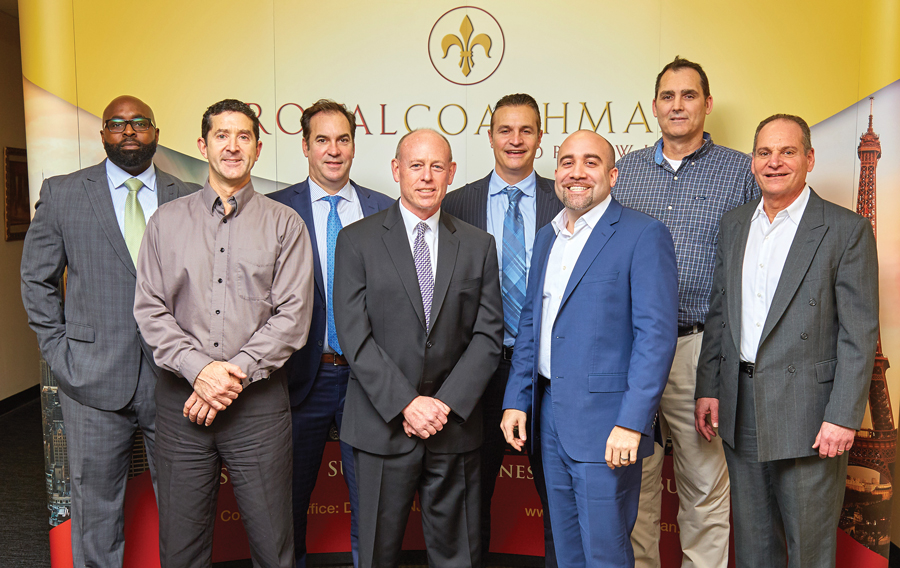 Representatives from Royal Coachman and Leros Point to Point at Royal Coachman’s location. L to R: Royal Coachman Head of Business Development Zorian Ricks, Royal Coachman Head of Accounting Marc Monsko, Leros CEO Jeff Nyikos, retiring Royal Coachman President Jon Epstein, Leros CFO Chris Nyikos, Leros Executive Vice President Jeffrey Cartagena, Royal Coachman Dispatch Manager Don Tropila, and Royal Coachman CFO Larry Abraham
CD: Jon, how did you announce the acquisition to your staff?
Representatives from Royal Coachman and Leros Point to Point at Royal Coachman’s location. L to R: Royal Coachman Head of Business Development Zorian Ricks, Royal Coachman Head of Accounting Marc Monsko, Leros CEO Jeff Nyikos, retiring Royal Coachman President Jon Epstein, Leros CFO Chris Nyikos, Leros Executive Vice President Jeffrey Cartagena, Royal Coachman Dispatch Manager Don Tropila, and Royal Coachman CFO Larry Abraham
CD: Jon, how did you announce the acquisition to your staff?
JE: We didn’t tell anyone about the deal until we got very close to it being finalized. Then, with my help, Leros identified four key employees who they wanted to lock into their positions. These are my top people within the company who essentially run the show, and they were all on board with the change. So, they met with Leros a couple of times to get to the right comfort level. Leros is a family business, just like we are. They treat people the same way we have. That part of it was a good fit.
It wasn’t until two days after the closing that I sat down and talked with everybody. We then sent an announcement to the chauffeurs, since you can’t really get them in one place at one time. I talked to everyone individually and explained the situation—and, of course, there was some concern. But once they met the Leros crew and saw how things were going, it’s been so far, so good. Everyone’s still here, and no one’s expressed interest in leaving. They like what’s happening. It makes things much easier on me to know that my people are going to be here and be productive. Personally, I like the fact that the name’s staying around.
CD: What kind of fleet are you getting from Royal Coachman? In terms of service, what can clients expect from the change in ownership, if anything?
JN: What we’ve traditionally done when we’ve bought a company is essentially purchase an operation’s phone number, their drivers’ goodwill, and some key people on staff, and then roll it into our existing infrastructure. This is a new situation because we’re basically creating another hub for us with a full working office, maintenance, and a full fleet.
JE: Royal Coachman has a fleet of more than 100 vehicles, which includes a ton of sedans, SUVs, Ford Transit vans, and minibuses that seat up to 32. Of course, Leros has vehicles bigger than that, as well, so already it’s been cool to see we’re trading rides back and forth. Right now, we have one of their bigger vehicles here in N.J. doing a shuttle job. It’s mix and match; there’s a lot more resources available now to do the rides that make sense for the clients.
JN: In the past when we’ve acquired a business, we never bought anyone’s fleet. From a logistical standpoint, it’s new to us because you can’t buy a business with all of those licensed vehicles and have the Department of Motor Vehicles switch that over to a different owner overnight. That’s something we had to consider when buying an operation of this size.
In terms of service, we feel that having a hub with an existing fleet will make the chauffeurs more efficient and, therefore, they’ll make more money. For instance, we just got a call for a shuttle from Tarrytown, N.Y., to Basking Ridge, N.J. This is a situation where we can use our resources to make things run much more efficiently.
CN: Especially in this area, where you have bridges and tolls as expensive as they are, you want to run as efficiently as possible to pass that savings along to the customer. It’s a win-win for everyone.
JN: Currently, Leros services a lot of companies in N.Y. that have employees who live in N.J. Our rates have been competitive in N.J. but not as competitive as Royal Coachman’s. Now, we can go to our clients and say, “We have more than 100 vehicles in the N.J. market, so we can offer you more competitive pricing.” On the flipside, we’ll be able to be competitive for the Coachman clients who are going to N.Y., too.
JE: And also, Leros is more aggressive on the worldwide side and we’re hoping Royal Coachman will get more penetration there as well by utilizing their affiliates and pricing structure.
CD: Jon, are you truly leaving the industry for good or do will you be active in a limited capacity?
JE: I’m pretty much gone for good but I have many close friends in the industry, so I’ll certainly be around in some respect. I’ve made many friends over the years, so, to me, these relationships are way more than just ground transportation. We know each other’s families. While I don’t foresee myself doing anything in this industry again, I won’t be invisible.
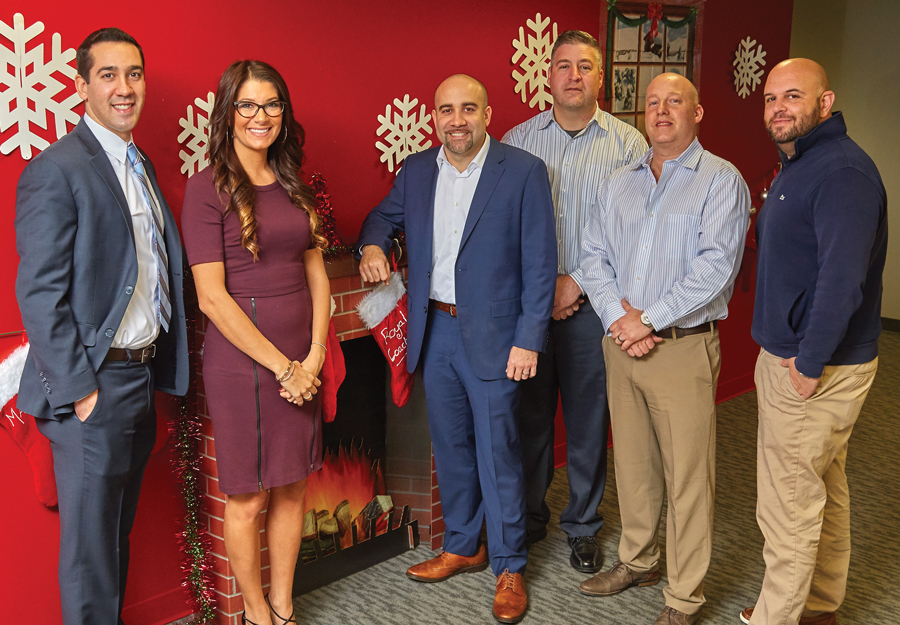 Roasting by an open fire in the Leros Reservation Department (L to R): Vice President of Business Development Dan Aucar, Reservation Manager Kelcy Peterson, Executive Vice President Jeffrey Cartagena, Chauffeur Manager Kevin Giaccone, Dispatch Manager Vincent Nicoletti, and Chief Technology Officer Frank Pirrone
CD: What are Leros’ plans and strategies in the future?
Roasting by an open fire in the Leros Reservation Department (L to R): Vice President of Business Development Dan Aucar, Reservation Manager Kelcy Peterson, Executive Vice President Jeffrey Cartagena, Chauffeur Manager Kevin Giaccone, Dispatch Manager Vincent Nicoletti, and Chief Technology Officer Frank Pirrone
CD: What are Leros’ plans and strategies in the future?
JN: Our goal has always been to continue to grow, and we do that by building a sales team, through marketing, and by acquisitions. If something comes down the pike a year from now, we’d likely be open to doing another deal like this, but, for right now, our goal is to be as efficient as possible with communication and software, focus on customer service and passenger safety, and grow through sales and marketing. The ultimate goal would be continuing to add hubs along the eastern seaboard.
MB: It doesn’t have to just be growth through acquisitions; it could be strategic partnerships. But, in terms of acquisitions, hopefully, we can build a blueprint from this so that things are even easier the next time.
CD: Do you have advice for other operators who may be looking to buy or sell a company?
MB: If you’re looking to get out, do it while you’re doing well. What was interesting to me was when the economy took a downturn a few years back, we thought that was a good opportunity to acquire companies. We found that people didn’t want to sell when they were coming off of their worst year. The time to sell or acquire is when you’re doing well—when your recent numbers are at a high.
JN: We have a structure in place and we feel the price we put on the company is fair market value. The problem is that many people who are looking to get out have a false sense of what their business is worth. We’ve bought companies, and have seen other operations get bought out, so we have a good idea of what every company is worth. No one’s going to come in and pay dollar-for-dollar like in the ’90s when private equity firms were buying up companies. That was a once-in-a-lifetime experience.
The decision to sell really has to come from having the right mindset, and Jon was at that point in his life. You can’t approach getting out by only thinking of the money: You have to be mentally prepared to walk away and do something else. Some people walk away because they’re burnt out; other people just want a change.
JE: It’s about relationships, luck, and timing. It needs to happen organically or naturally.
JN: This was a unique deal, but I think there could be a lot more deals like it in the future. There are a lot of strong relationships forming between people, and they may look toward each other as the competition gets fiercer. You’re going to see a lot more mergers and acquisitions in the next five years, and they’re going to be relationship driven. [CD0119]

